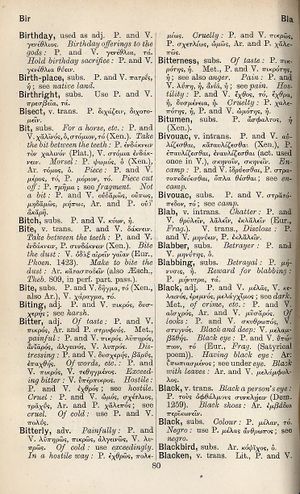bitter
English > Greek (Woodhouse)
adj.
Of taste: P. and V. πικρός, Ar. and P. στρυφνός.
Met., painful: P. and V. πικρός. λυπηρός, ἀνιαρός, ἀλγεινός, V. λυπρός.
Distressing: P. and V. δυσχερής, βαρύς, ἐπαχθής.
Of words, etc.: P. and V. πικρός, V. τεθηγμένος.
Exceeding bitter: V. ὑπέρπικρος.
Hostile: P. and V. ἐχθρός; see hostile.
Cruel: P. and V. ὠμός, σχέτλιος, τραχύς, Ar. and P. χαλεπός; see cruel.
Of cold: use P. and V. πολύς.
German > Latin
bitter, amarus (nicht süß, herb, Ggstz. dulcis, eig. u. uneig.). – acerbus (beißend, scharf, Ggstz. mitis, suavis; bes. uneig. = »hart, streng«, wie Feind, Feindschaft, Haß; dann = »empfindlich treffend etc.«, wie Witz etc.). – gravis (heftig, wie Feind, Feindschaft). – mordax (beißend anzüglich, wie Verse, Worte etc.). – b. Geschmack, sapor amarus od. acerbus; im Munde (bei Krankheiten), os amarum: b. werden, inamarescere. – das Bittere des Verweises, quod acerbitatis habet obiurgatio: b. Klage führen, s. unten Adv.: jmdm. bittere Vorwürfe machen, aspere vituperare alqm: in sehr bitteren Ausdrücken jmdm. schreiben, acerbissime alci scribere: bittere Früchte von etw. ernten (bildl.), fructus magnā acerbitate permixtos ferre ex etc.: in der bittersten Armut leben, in summa egestate od. mendicitate vivere. – Adv.amare (eig. u. uneig.); acerbe. aspere. graviter (uneig.). – gegen jmd. b. (in Worten) sein, acerbe increpare alqm; acerbius invehi in alqm: jmd. recht b. kränken, alci quam acerbissimum dolorem inurere: sich d. beklagen (b. Klage führen) über etwas, graviter queri alqd; über jmd., acerbe od. graviter accusare alqm.

